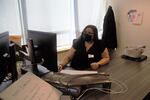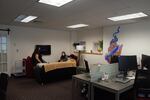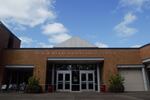Students of color at Western Oregon University now have a space to call their own — at least a temporary one.
This summer, Western allocated about $200,000 toward the “Freedom Center,” a student-led space dedicated to supporting students of color by offering resources related to mental health and wellbeing.
WOU student Makana Ripley is one of the co-directors of the Freedom Center Board, and among the students who had been working for months on a proposal about the Freedom Center before it became a reality.

Makana Ripley is the Freedom Center's co-director. She sits at her desk before the center's grand opening event at Western Oregon University in Monmouth on Friday, Oct. 1, 2021.
Meerah Powell / OPB
When the center’s new office space was beginning to come together, Ripley was thrilled.
“It definitely hit me in that moment that something good had happened,” she said, “and that we could see the fruits of our labor, which to be honest, I didn’t know if we ever would.”
The Freedom Center is currently located in the university’s student union building in the heart of the Monmouth campus.
The center occupies a room that used to be a student lounge. It’s a small space for what Ripley and other students fully envision. It was initially just going to be office space for Freedom Center board members, but the group re-designed one corner to encourage students to come in and hang out. It has couches and chairs, as well as coffee, snacks and a TV.
“This is for the Freedom Center Board space,” Ripley said. “But we do know that students need resources now and can’t wait ... for those things, so we’re trying to double up.”
The Freedom Center’s office will stay there most likely until Fall 2023, when WOU’s new Student Success Center is set to open. Then, the Freedom Center will move into a larger, permanent space there.
“In the meantime, we will be in this space serving students as much as we can,” Ripley said.
Welcoming in students
Like the majority of Oregon’s public universities, Western recently welcomed students back to campus after a year of having fewer in-person classes and experiences during the pandemic.
Ripley said about 80 students have visited the Freedom Center since on-campus housing move-in began Sept. 19.
“We’ve been trying really hard to let students know that we’re here,” Ripley said.
She said a lot of the Freedom Center’s first year will be gauging what specific services students are looking for.
“Students coming back from a COVID year — COVID life — need very different services than what we saw pre-pandemic,” Ripley said. “So, we want to use this year as a survey year to figure out, what do they really need?”
Along with food and a place to relax and socialize, the center hopes to help students of color get access to university resources if they are dealing with issues surrounding any sort of discrimination, bias or microaggressions.

Makana Ripley (left) sits with two student volunteers in the Freedom Center on Friday, Oct. 1, 2021, at Western Oregon University in Monmouth, Oregon.
Meerah Powell / OPB
“We try to tell students, ‘If something happens in your class, and you’re kind of on the fence of if you feel like it hurt, but you don’t really know where to go, come talk to us. We understand the processes; we can tell you what’s available, and then we can try and change some of those cultures and systems so that it doesn’t happen again,’” Ripley said.
Ripley noted that WOU already has Multicultural Student Services and Programs, or MSSP — a department that helps students of color with academic support and advising.
“We like to think of it as we’re a team trying to support students of color across campus,” Ripley said. “A lot of the times [the MSSP] becomes the catch-all, and they get a lot of those concerns and students just having a really bad day, and they are a very small office. So that’s where we come in … we try and fill those gaps.”
Ripley noted that although the Freedom Center was created by and for students of color, the space is still open to all students.
“Every student is welcome into the Freedom Center,” she said. “We’re never going to exclude someone based on what they look like because that’s how students of color are treated, so we’re never going to do that. We just want to cater our services to support students who don’t get what every other student gets.”
The Freedom Center officially opened Friday by hosting a grand opening event to showcase the new space.
The center has also partnered with the cities of Monmouth and Independence for events during Hispanic Heritage Month, and it plans on putting on other events and fundraisers as the school year continues.
Moving forward
Ripley said the center has big hopes for its future space in the next few years.
The center hopes to bring on professional staff down the line including a counselor and someone who can assist undocumented students with navigating the Deferred Action for Childhood Arrivals, or DACA, process.
She said she also hopes the future space has a full kitchen, so that students can have a place to come and cook foods from their cultural backgrounds.
“The students and employees of Western Oregon University have worked for many years to create an environment of inclusion and support for our campus community members of color,” the university said in a statement. “We’re proud that our students have created the new Freedom Center, which is a place ‘by BIPOC students for BIPOC students’ and offers a number of opportunities for our students.”

The Freedom Center is currently located in the Neal W. Werner University Center, Western Oregon University's student union building.
Meerah Powell / OPB
It was a long road to get to the Freedom Center’s opening.
Earlier this year, Ripley presented the proposal for the Freedom Center to WOU’s Board of Trustees, but she and other supporters then had to resubmit it through a task force established by then-president Rex Fuller. At the time, she and other students had also pushed for the creation of a Director of Equity and Inclusion at the school. The university said it’s now working to hire a DEI administrator to serve on the president’s cabinet.
Ripley is a fourth-year student, and she hopes to graduate at the end of this academic year. That means she won’t be able to see the Freedom Center come to fruition in its permanent space.
Still, she said she sees a lot of potential with what she and other students have currently built.
“I was able to see the future generations of students that won’t have to feel the way I felt my first three years here, that would get the support they needed no matter what they look like, and that they won’t have to fight for as much,” Ripley said.
Ripley came to WOU as a transfer student, originally from Hawaii.
“I came out here, and I didn’t live on campus, and I really didn’t feel like I had any community,” she said. “I think that that was something I desperately needed, was just a friend, just somebody to care how my day was going, to ask me if I was alright … Sometimes, it’s just those really little things, and I think that us having this space shows students that it’s possible to have support like that.”

